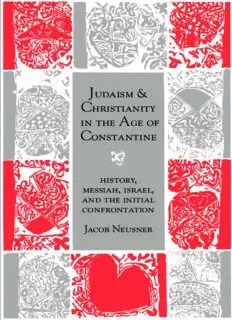
Judaism and Christianity in the Age of Constantine: History, Messiah, Israel, and the Initial Confrontation (Chicago Studies in the History of Judaism) PDF
Preview Judaism and Christianity in the Age of Constantine: History, Messiah, Israel, and the Initial Confrontation (Chicago Studies in the History of Judaism)
J udaism & C hristianity A in the ge of C onstantine history, messiah, israel, and the initial confrontation Jacob Neusner Judaism and Christianity in the Age of Constantine Chicago Studies in the History of Judaism EDITED BY Jacob Neusner, William Scott Green, and Calvin Goldscheider Judaism and Christianity in the Age of Constantine History, Messiah, Israel, and the Initial Confrontation Jacob Neusner The University of Chicago Press Chicago and London TheUniversityofChicagoPress,Chicago60637 TheUniversityofChicagoPress,Ltd.,London ©1987byTheUniversityofChicago Allrightsreserved.Published1987 Paperbackedition2007 PrintedintheUnitedStatesofAmerica 16 15 14 13 12 1110 09 08 07 2 3 4 5 6 ISBN-13:978-0-226-57652-7(cloth) ISBN-13:978-0-226-57653-4(paper) ISBN-10:0-226-57652-3(cloth) ISBN-10:0-226-57653-1(paper) LibraryofCongressCataloging-in-PublicationData JudaismandChristianityintheageofConstantine. (ChicagostudiesinthehistoryofJudaism) Bibliography: p. Includesindex. 1. Judaism—relations—Christianity. 2. Christianity andotherreligions—Judaism. 3. Judaism—History— Talmudicperiod,10–425. 4. Christianity—Earlychurch, ca.30–600. 5. Midrash—Historyandcriticism. I. Neusner,Jacob,1932– . II. Series. BM535.J822 1987 292.3(cid:2)872 87–5952 ISBN0–226–57652–3 (cid:4)∞Thepaperusedinthispublicationmeetstheminimum requirementsoftheAmericanNationalStandardfor InformationSciences—PermanenceofPaperforPrinted LibraryMaterials,ANSIZ39.48-1992. For my nearest and dearest colleagues WENDELL S. DIETRICH ERNEST S. FRERICHS CALY IN GOLDSCHEIDER ALAN ZUCKERMAN My teachers, my companions Better the honor of enjoying the friendship of these aristocrats of intellect and of heart than any honors the world has in its power to confer. I glory in these colleagues, I take pride that mine is the merit of sharing career, profession, life itself with such as these . . einen besseren findst du nicht . Contents Preface ix Acknowledgments xv Introduction 1 Religion and Political Change 1 Judaism without Christianity 4 The Judaic Sages' Canon in the Context of the Fourth Century 7 Their Intent, Our Interpretation 11 1. Judaism and Christianity in the Age of Constantine 13 Christianity and the Roman Empire in the Age of Constantine 13 Jews in the Land of Israel in the Fourth Century 18 Judaism in the Land of Israel 23 2. Genesis Rabbah and Israel's History: Christian and Judaic Theories of History and Its Meaning 29 The Issue of History: Events, Patterns, Proofs 29 Eusebius and the Beginnings of Christian Historiography 31 Genesis Rabbah and Israel's Historical Crisis 36 3. The Talmud of the Land of Israel and the Messiah: Christian Triumph, Judaic Response 59 vii viii Contents The Messianic Crisis 59 Chrysostom: Jewish Unbelief, Christian Wavering 61 The Talmud of the Land of Israel and Israel's Messianic Crisis 65 4. Leviticus Rabbah, Genesis Rabbah, and the Identification of Israel 81 Who Is Israel? 81 Aphrahat and the People Which Is No Peoples 85 Leviticus Rabbah and Israel's National Crisis 94 Genesis Rabbah: The Claim of the Siblings 106 Genealogy and the Political Crisis 111 5. Politics and Proof-Texts: Exegesis and Canon 114 A Test of Falsification 114 Same Topic, Different Program: No Encounter 117 Jerome and the Christian Exegetical Tradition 119 Sifre to Numbers and the Judaic Exegetical Tradition 124 The Christian Canon in the Fourth Century: Old and New Testaments 128 The Judaic Canon in the Fourth Century: The Written and Oral Torah 133 The Absence of Confrontation 141 Epilogue: The Shape of the Initial Encounter and the Enduring Confrontation 146 Sages' Success in the Initial Encounter 146 The Enduring Confrontation 149 Appendixes l. Genesis Rabbah on Israel's History 153 2. Aphrahat on Israel 191 3. Leviticus Rabbah on Israel 203 4. Genesis Rabbah on Israel 224 Bibliography 231 Index 237 Preface Judaism and Christianity as they would live together in the West met for the first time in the fourth century_ It was then that Judaism addressed the histori cal triumph of Christianity in a political form that would persist, and that Christianity met the Israel defined by the sages of the dual Torah, the Israel that would enjoy enduring life in the Jewish people from then until now. Be ginning with the conversion of Constantine in 312 and ending with the recog nition of Christianity as the religion of the Roman Empire in the Theodosian Code of 387, Christianity reached that position of political and cultural domi nance that it would enjoy until the twentieth century_ In our own day Chris tianity has entered an age no longer responsive to its politics. This book is about the first meeting, a confrontation that, for Judaism, defined three im portant terms of the Judaic system from that time onward. Specifically, in the fourth century, in response to the triumph of Christianity in the Roman Em pire, Judaism as shaped by sages in the Land of Israel defined its doctrines of history, Messiah, and the identity of Israel. Those doctrines successfully countered the challenge of Christianity from then to the point at which Chris tianity lost its status as self-evident truth in the West. It follows that Judaism as we have known it was born in the matrix of triumphant Christianity as the West would define that faith. I The age of Constantine was marked by the interplay of issues that were de fined in the same way by Judaism and Christianity. In the context of tri umphant Christianity, Judaic thinkers represented in the important documents of the late fourth or early fifth century, the Talmud of the Land of Israel of the Land of Israel, Genesis Rabbah, and Leviticus Rabbah, sorted out those three central questions that had long presented points on which each party framed its own ideas. But, transformed by the events of the age from merely chronic 1. In my Death and Birth of Judaism (1987a) I argue that the success of Judaism in the West derives from its response (a self-evidently valid one, to Jews) to the urgent and paramount ques tion presented by triumphant Christianity. This is a point I further work out in my Self-Fulfilling Prophecy (l987b). ix
